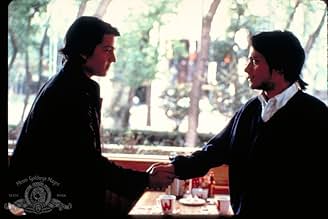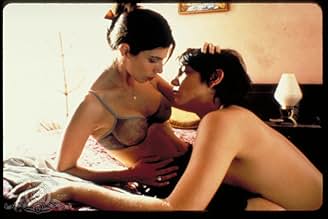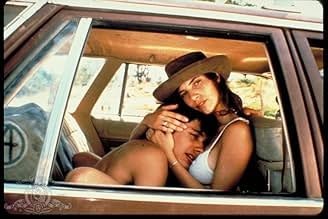Au Mexique, deux adolescents et une femme âgée séduisante se lancent dans une virée en voiture et apprennent une ou deux choses sur la vie, l'amitié, le sexe et sur eux-mêmes.Au Mexique, deux adolescents et une femme âgée séduisante se lancent dans une virée en voiture et apprennent une ou deux choses sur la vie, l'amitié, le sexe et sur eux-mêmes.Au Mexique, deux adolescents et une femme âgée séduisante se lancent dans une virée en voiture et apprennent une ou deux choses sur la vie, l'amitié, le sexe et sur eux-mêmes.
- Réalisation
- Scénario
- Casting principal
- Nommé pour 1 Oscar
- 39 victoires et 48 nominations au total
Avis à la une
The two teenage males in this sharply etched film, "Y tu mama tambien," are obsessed with sex and view its pleasures as something akin to joyfully skating across a frozen lake. As the story develops the ice gets thinner and thinner, its incapacity to carry the weight of their fantasies advances faster than their growing inevitable end stop - maturity.
The Mexico of the teenagers and their generally stoned friends is one of affluence and political connectedness. One father belongs to a country club that features one of the biggest private swimming pools I've seen - no film set here (the pool is the scene of a very, ah, unusual depiction of teen horniness). Neither of the lads cares much about the actual political and social issues occurring during their adventures and which are seamlessly integrated into their story. Their futures are a blank to them but a blank untroubled by the need to be concerned or ambitious.
And then arrives the femme fatale, a beautiful, smart but very raunchy just-left-husband gal with whom they take off in a beaten-up old station wagon to find, ostensibly, a secret beach. Of course what the guys have in mind is seduction.
Without a polemical discourse the viewer is carried into the isolation and poverty of much of Mexico as asphalt yields to hard dirt roads leading to barely navigable sand traps. The people they encounter along the way are realized subtly but effectively.
These teens aren't really so likable but they do show occasional promise of growing up, a redeeming feature. This is less a road film than it is a comedy of (very bad) manners. The director and three leading characters have taken raunch to a new and interesting cinematic plane.
While these kids may be a parent's nightmare, they become more complex, and inevitably more insightful, as the film develops. By the end they are very, very different people and in danger of becoming sort of plain vanilla post-teens (whatever the Mexican equivalent of the Japanese "salaryman" is, they may well be launched along that path).
This film is rated "R" but many will wonder how it avoided an "X." Be forewarned. But some of the sex scenes are hilarious - especially if the viewer has ever been a teenager. :)
Cuaron uses voiceovers not so much to explain the story but to quietly show that all lives have "sidebar" events beyond the tale being told, events that can be described in one or two sentences and which illuminate the fullness of a character's journey.
The scenery is gorgeous.
Definitely a different and engrossing story.
The Mexico of the teenagers and their generally stoned friends is one of affluence and political connectedness. One father belongs to a country club that features one of the biggest private swimming pools I've seen - no film set here (the pool is the scene of a very, ah, unusual depiction of teen horniness). Neither of the lads cares much about the actual political and social issues occurring during their adventures and which are seamlessly integrated into their story. Their futures are a blank to them but a blank untroubled by the need to be concerned or ambitious.
And then arrives the femme fatale, a beautiful, smart but very raunchy just-left-husband gal with whom they take off in a beaten-up old station wagon to find, ostensibly, a secret beach. Of course what the guys have in mind is seduction.
Without a polemical discourse the viewer is carried into the isolation and poverty of much of Mexico as asphalt yields to hard dirt roads leading to barely navigable sand traps. The people they encounter along the way are realized subtly but effectively.
These teens aren't really so likable but they do show occasional promise of growing up, a redeeming feature. This is less a road film than it is a comedy of (very bad) manners. The director and three leading characters have taken raunch to a new and interesting cinematic plane.
While these kids may be a parent's nightmare, they become more complex, and inevitably more insightful, as the film develops. By the end they are very, very different people and in danger of becoming sort of plain vanilla post-teens (whatever the Mexican equivalent of the Japanese "salaryman" is, they may well be launched along that path).
This film is rated "R" but many will wonder how it avoided an "X." Be forewarned. But some of the sex scenes are hilarious - especially if the viewer has ever been a teenager. :)
Cuaron uses voiceovers not so much to explain the story but to quietly show that all lives have "sidebar" events beyond the tale being told, events that can be described in one or two sentences and which illuminate the fullness of a character's journey.
The scenery is gorgeous.
Definitely a different and engrossing story.
People don't get this movie..there is so much more the just coming of age and having sex. It is also about the social disparity in Mexico. That is what all the overdubs were for. Every time there was an voice-over something of meaning was said about the surroundings and the way the average Mexican lives. Don't think of this movie as a story about three people, think of it as a story about a whole nation. I encourage everyone to watch it again. Please pay attention to the scene in the boat. that almost makes me cry. It is so well worded also. And the way the voiceovers just cut abruptly is a great. There are so many small things about this movie that make it so much better then your average Hollywood movie.
I saw the film twice in 2 days (in original version), and I enjoyed it very much. It is titillating, at times hilarious, touching, candid, serious etc... Roller-coaster of emotions! It is the first film I have seen with Gael Garcia Bernal (Julio in this film), and boy is he great! I love the portrait the film draws of "Teenage Boys lust". The contrast with the mature and controlled Luisa is very interesting. Altogether, I'd recommend it warmly to anyone who enjoys road movies in general and great characters. Obviously it is better in the original, so if you understand a bit of Spanish, don't be put off by the subtitles (you end up reading them really quickly and still enjoy the images...).
In many ways Alfonso Cuaron's "Y Tu Mama Tambien" reminds me of the desolation theme of Bernardo Bertolucci's "Ultimo tango a Parigi" (1972) and the deceptive perspective of Michelangelo Antonioni's "L'Avventura." (1960).
Raging post-adolescent hormonal drives seem to propel Julio and Tenoch forward, with little else of substance to account for. Likewise, Luisa's motivation seems more despair- than romance-driven. Thus, the trio's trek in search of the idyllic Boca del Cielo is reminiscent of the forlorn lovers' quest for emotional fulfillment in the Bertolucci film.
Comparison with the Antonioni opus stems from Cuaron's script seemingly being about a carefree, liberated trio on a journey for fun, when in fact, it's really about escape from their own worst "enemies"--themselves.
After a particularly talky beginning (complete with abundant narrations) the film settles in on its main theme, and the dialogue becomes more pointed. While the camera work is generally appropriate, Cuaron tends to rely on long- to medium-shots, with nary a close-up.
The result of this is a somewhat distant enactment, in which the viewer is held a bit at arm's length from the action. One seldom gets close enough to become intimately acquainted with these people. In the end, one is touched by important revelations which are crucial to understanding that which has transpired. Yet, the viewer's emotional involvement is perhaps less than what it might have been, given closer perspectives.
This film obviously impressed many people, and I must agree the work by the principles is uniformly solid. This is a "last tango" which has made its mark as a distinctive film work.
Raging post-adolescent hormonal drives seem to propel Julio and Tenoch forward, with little else of substance to account for. Likewise, Luisa's motivation seems more despair- than romance-driven. Thus, the trio's trek in search of the idyllic Boca del Cielo is reminiscent of the forlorn lovers' quest for emotional fulfillment in the Bertolucci film.
Comparison with the Antonioni opus stems from Cuaron's script seemingly being about a carefree, liberated trio on a journey for fun, when in fact, it's really about escape from their own worst "enemies"--themselves.
After a particularly talky beginning (complete with abundant narrations) the film settles in on its main theme, and the dialogue becomes more pointed. While the camera work is generally appropriate, Cuaron tends to rely on long- to medium-shots, with nary a close-up.
The result of this is a somewhat distant enactment, in which the viewer is held a bit at arm's length from the action. One seldom gets close enough to become intimately acquainted with these people. In the end, one is touched by important revelations which are crucial to understanding that which has transpired. Yet, the viewer's emotional involvement is perhaps less than what it might have been, given closer perspectives.
This film obviously impressed many people, and I must agree the work by the principles is uniformly solid. This is a "last tango" which has made its mark as a distinctive film work.
From the recent comments on this film board, it's amazing how people can watch this film all the way through and at the end not have any idea what it was about.
This was quite simply one of the best films I've seen in recent years. Using three central characters -- two immature adolescent males and a young woman in crisis -- set in a road-trip situation, it was hardly a road-trip movie. Nor was it an adolescent movie. Nor was it a woman-in-crisis movie. Nor was it about sex. Instead, what starts out with a sizzling but ditzy prologue becomes something much deeper and much more profound as it goes along. By the end I was breathless and somewhat stunned. The character study is amazing. The societal insights are haunting. The shared humanity it exposes is painful at time but ultimately reaffirming and uplifting. These are three of the most memorable, identifiable and completely human characters I've seen on screen in ages. They taught me more about life and the human species than the last ten movies I've seen put together. I'll not soon forget Julio, Tenoch and Luisa and their eye-opening journey to Boca del Cielo.
This was quite simply one of the best films I've seen in recent years. Using three central characters -- two immature adolescent males and a young woman in crisis -- set in a road-trip situation, it was hardly a road-trip movie. Nor was it an adolescent movie. Nor was it a woman-in-crisis movie. Nor was it about sex. Instead, what starts out with a sizzling but ditzy prologue becomes something much deeper and much more profound as it goes along. By the end I was breathless and somewhat stunned. The character study is amazing. The societal insights are haunting. The shared humanity it exposes is painful at time but ultimately reaffirming and uplifting. These are three of the most memorable, identifiable and completely human characters I've seen on screen in ages. They taught me more about life and the human species than the last ten movies I've seen put together. I'll not soon forget Julio, Tenoch and Luisa and their eye-opening journey to Boca del Cielo.
Le saviez-vous
- AnecdotesAlfonso Cuarón did not want to cast Luna for the role of Tenoch because he was a teen idol and soap opera star. Bernal convinced Cuarón to hire Luna because their strong existing friendship would make the performance of their characters' friendship much easier. Cuarón ultimately hired Luna because he became convinced that their bond would produce a natural and honest performance.
- GaffesThe movie takes place in the summertime - we know this from the boys just having graduated, their girls going off to Europe, the weather, etc. Yet at the wedding near the beginning of the film, the narrator tells us that in a few days the president of Mexico will go to Seattle for the WTO conference - which happened in November.
- Versions alternativesSeveral scenes edited out of the final movie were made available for public viewing on the movie's official Web site. The director claims to have created multiple edits of this film to satisfy censorship rules around the world. According to the director, one of these edits, allegedly intended for Mexican distribution in protest of that country's heavy censorship, runs less than 10 minutes.
- ConnexionsEdited into Y tu mamá también: Deleted Scenes (2002)
- Bandes originalesGo Shopping
Performed by Bran Van 3000
Contains samples from "Shopping" written by Eek-A-Mouse (as Ripton Hylton) and Jamal-Ski
Published by Plaything Music, Explicit Two & Eek-A-Mouse Music
administered by Plaything Music (ASCAP)
Eek-A-Mouse appears courtesy of Explicit Entertainment, by license from Sunset Boulevard Entertainment
Meilleurs choix
Connectez-vous pour évaluer et suivre la liste de favoris afin de recevoir des recommandations personnalisées
Détails
Box-office
- Budget
- 2 000 000 $US (estimé)
- Montant brut aux États-Unis et au Canada
- 13 839 658 $US
- Week-end de sortie aux États-Unis et au Canada
- 408 091 $US
- 17 mars 2002
- Montant brut mondial
- 33 616 692 $US
- Durée
- 1h 46min(106 min)
- Couleur
- Mixage
- Rapport de forme
- 1.85 : 1
Contribuer à cette page
Suggérer une modification ou ajouter du contenu manquant

![Regarder Tráiler [OV]](https://m.media-amazon.com/images/M/MV5BZDE5YjEwYTktN2NiYy00ZmZiLTk3YmEtOTYyYzljMTdkMGMzXkEyXkFqcGdeQXRodW1ibmFpbC1pbml0aWFsaXplcg@@._V1_QL75_UX500_CR0)































